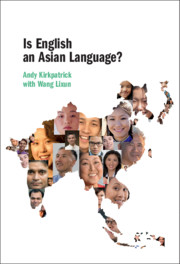Book contents
- Is English an Asian Language?
- Is English an Asian Language?
- Copyright page
- Dedication
- Contents
- Figures and Tables
- Introduction
- 1 How English Came to Asia
- 2 The Asian Corpus of English
- 3 Asian Varieties of English vs English as a Lingua Franca (ELF) in Asia
- 4 What Do Asian Multilinguals Talk about When Using English as a Lingua Franca?
- 5 The Transfer of Features and Communicative Strategies
- 6 Borrowing Words and Writing Asian Englishes
- 7 Non-standard Forms in Asian Englishes and ELF
- 8 English in Law, Religion and Popular Culture
- 9 English as a Language of Education in Asia
- 10 Implications for English Language Teaching in Asia
- 11 Conclusion
- References
- Index
11 - Conclusion
Published online by Cambridge University Press: 15 October 2020
- Is English an Asian Language?
- Is English an Asian Language?
- Copyright page
- Dedication
- Contents
- Figures and Tables
- Introduction
- 1 How English Came to Asia
- 2 The Asian Corpus of English
- 3 Asian Varieties of English vs English as a Lingua Franca (ELF) in Asia
- 4 What Do Asian Multilinguals Talk about When Using English as a Lingua Franca?
- 5 The Transfer of Features and Communicative Strategies
- 6 Borrowing Words and Writing Asian Englishes
- 7 Non-standard Forms in Asian Englishes and ELF
- 8 English in Law, Religion and Popular Culture
- 9 English as a Language of Education in Asia
- 10 Implications for English Language Teaching in Asia
- 11 Conclusion
- References
- Index
Summary
The concluding chapter will first draw together the empirical findings and return to the five uses of English in Asia identified by Kachru and which were discussed in the Introduction. English is developing new domains of use and an increasing number of Asians are becoming highly proficient speakers of English and are shaping English to their own uses and cultures, allowing them to develop a sense of ownership of the language. English is now an Asian language, both in and of Asia. This conclusion comes with no sense of triumphalism. On the contrary, the chapter will conclude with the prediction that, unless regional governments develop holistic and coherent language education polices, it is likely that English will continue to increase its range at the expense of local and regional languages. It will be reiterated that delaying the introduction of English will result in a win-win solution through which students can graduate from secondary school, proficient in English and fluent and literate in their respective national language and their home language. As a language of Asia, English does not need to replace Asian languages.
- Type
- Chapter
- Information
- Is English an Asian Language? , pp. 196 - 201Publisher: Cambridge University PressPrint publication year: 2020

